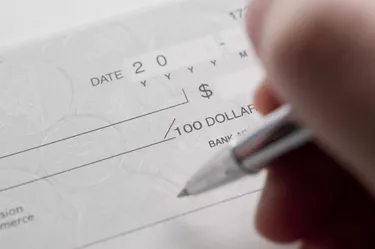
Being paid by check is less convenient when you don't have a bank account, or if you need the funds faster than a bank would make them available. You don't need a bank account to cash most checks, however. Whether it's a cashier's check that uses the bank's funds or a personal check drawn from an account there, you'll have several options to get your money.
The Issuing Bank
Video of the Day
A bank will cash its own checks or checks that it issued even for those who aren't customers. You'll have to show a government-issued ID and sometimes go through more stringent identification procedures. For example, some banks record a thumb print for non-customers, while others request your contact information to protect against fraud. Banks often charge a small fee for cashing the check, which is waived if you open an account and use it to deposit the check instead.
Video of the Day
Check Cashing Stores
Many check cashing stores will accept personal checks and cashier's checks, with some restrictions. Out-of-state personal checks aren't accepted everywhere, as they're considered to be a higher risk. Many of these stores also limit the size of checks that can be cashed, particularly if you don't have a history with the store. You'll pay a fee based on your state regulations, the type of check and the dollar amount on the check.
Major Retailers or Third-party Checks
You'll be able to cash bank checks at certain retailers. 7-11, for example, will cash checks in stores that have Vcom kiosks. You also can make arrangements with friends or family members to give you cash in exchange for you signing the check over to them. These third-party checks can be harder for that party to cash, but if they have a bank account they'll likely be able to deposit it in their account.
Customer Risks
Regardless of where you go, the representative will probably scan the check and use a third-party verification service to determine whether it's too risky to accept. You might not be able to cash the check if you've written bad checks in the past, or if the check looks suspicious. If you're able to cash a check that turns out to be fraudulent, you'll be responsible for refunding what you received.